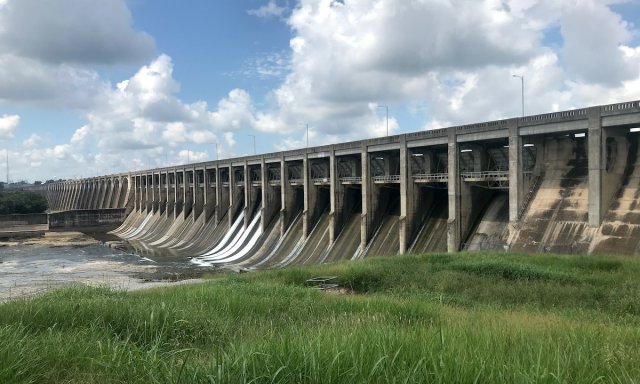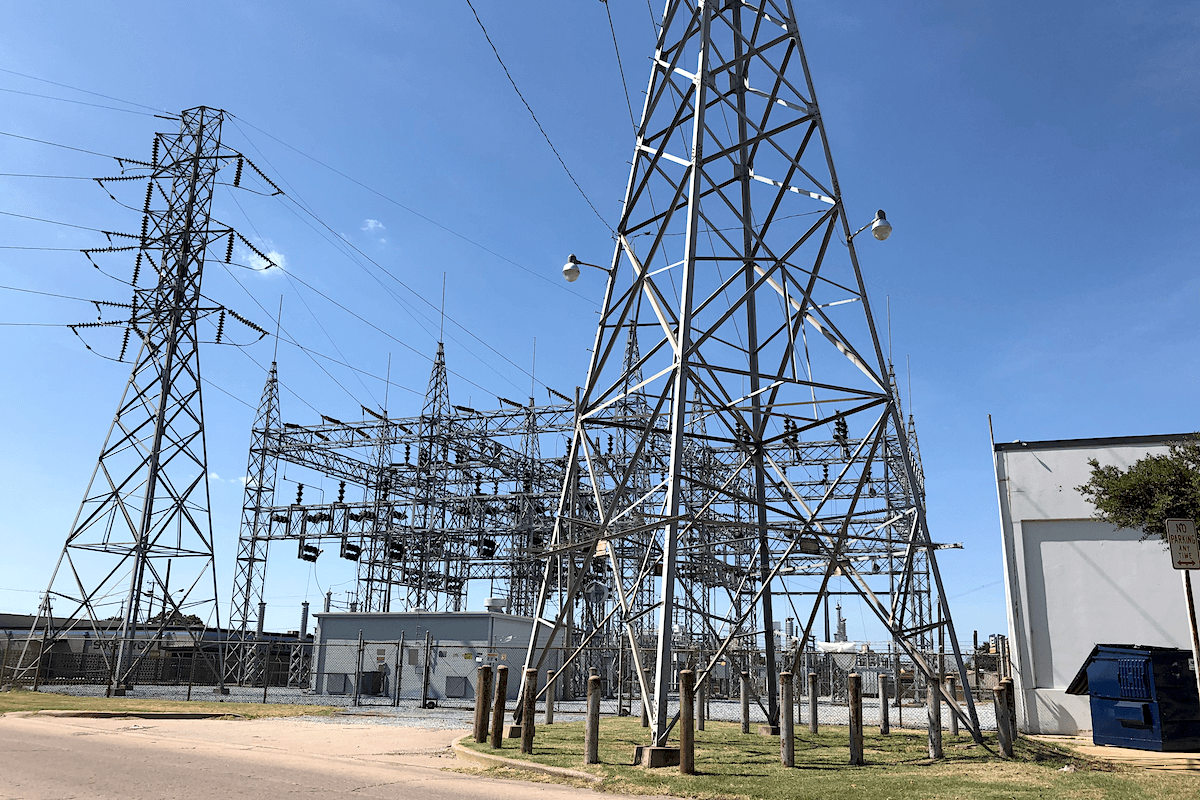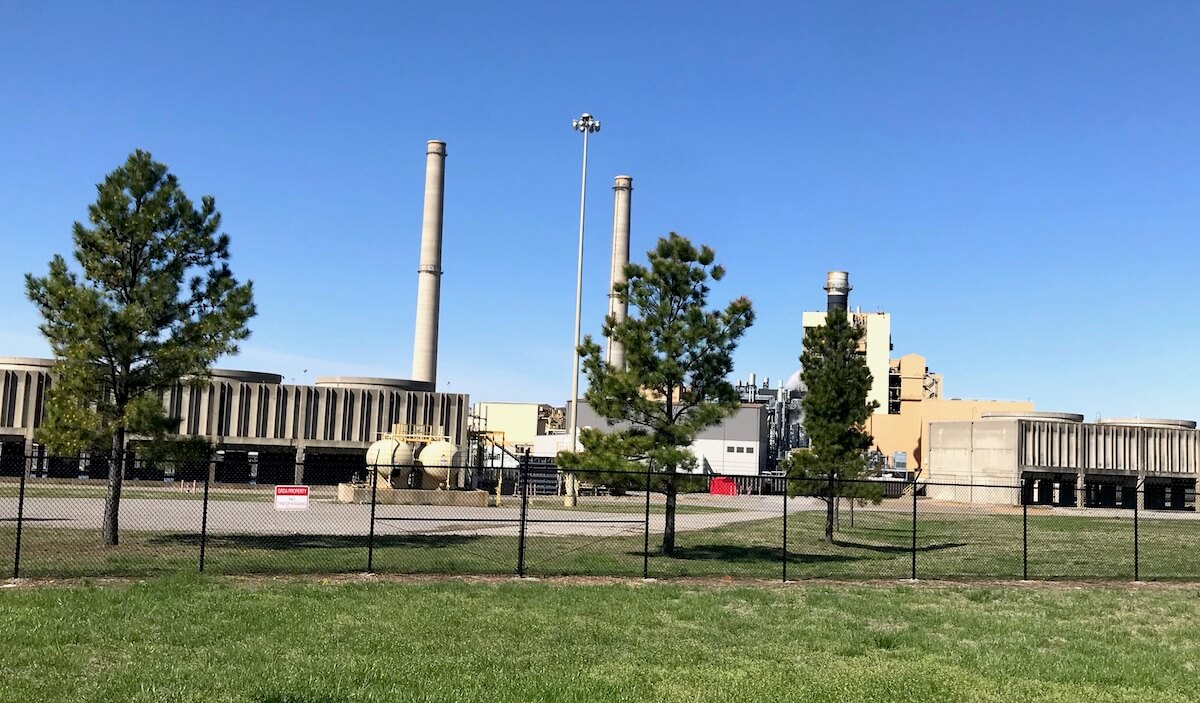

Should the Oklahoma Legislature grant the state’s largest public power utility an additional $1.39 billion in bonding capacity for expansion and improvement projects that could create greater competition with Public Service Company of Oklahoma and OG&E?
That question and others are being asked by the Joint Legislative Task Force on the Grand River Dam Authority, which held private conversations in an executive session earlier this month and which is expected to reconvene at 1:30 p.m. Thursday in Room 535 of the State Capitol.
If the task force recommends an increase for GRDA bonding capacity, SB 279 or a similar vehicle would likely receive a hearing by legislative budget committees, according to task force member and Senate Appropriations and Budget Committee Chairman Roger Thompson (R-Okemah).
“If the GRDA group will pass it out of there and recommend it, then I think it will get a hearing. If they don’t recommend it, then it won’t get a hearing,” he said. “So that’s going to be the first step.”
Last year, the Senate A&B Committee shot down a similar GRDA bonding capacity proposal by an 8-14 vote. Thompson voted in favor of that bill, but he still has questions about the state agency’s hefty request.
“I don’t have my mind made up yet whether I’m going to vote yes or no on it,” Thompson said. “I want to look at the overall picture. I’m reviewing some legal documents that I’ve asked for from GRDA about, if they sold it, who would be the benefactors of that? There’s been some outside counsel look at that.”
Discourse over whether Oklahoma should consider selling GRDA has percolated among political and utility leaders for years, with speculation running rampant in both directions when it comes to the push for a higher bonding limit: With newer and additional assets, the agency would have more to sell; with additional debt as a “poison pill,” the assets could be harder to privatize.
Thompson said GRDA officials have assured him that selling the agency’s electricity-producing assets — which provide energy for electric cooperatives, 15 municipalities and more than 80 industrial clients, including Google — is not part of their plan. But some state leaders, such as Senate President Pro Tempore Greg Treat (R-OKC), question whether a state agency should be competing in the power market at all. Treat filed a bill to privatize GRDA’s electricity assets three years ago.
“I philosophically have some concerns [with a state agency competing with private industry],” Treat said last week, noting that GRDA has asked to increase its bonding capacity for three or four years. “In the past, I’ve been opposed to it. I’ve asked for justification in what they plan on using it for. I’m open to the conversation. They talk about it hasn’t been amended since [1981]. That is not justification enough for me just because something hasn’t changed. So we’ll look at it.”
GRDA’s executive vice president for strategic communications, John Wiscaver, characterized the non-appropriated agency’s needs as a combination of looming infrastructure upgrades and desired flexibility to recruit businesses to Pryor’s Mid-America Industrial Park, for which GRDA provides power.
“We are the only state agency that even has a cap on bond capacity, and we are engaged and continue to be more engaged all the time in a lot of economic development opportunities,” Wiscaver said. “When [companies] are coming in and making decisions, they want to be able — in real time — to make those decisions. If we have to come and say to the Legislature, ‘Hey, we’ve got Entity A that is looking for a growth opportunity in Mid-America (Industrial Park), can we get more capacity to take on that?’ That just puts us in a really competitive disadvantage and (means we are) potentially losing on economic opportunities. We want to have the flexibility of having that opportunity ahead of time.”
He said the Southwest Power Pool will eventually ask GRDA — which the Legislature created in 1935 — to make millions of dollars’ worth of upgrades to transmission lines. Wiscaver also noted that many companies prefer to be located where they can buy power that is generated from cleaner sources. (GRDA operates three hydroelectric power plants and, in recent years, has built a new gas power plant in Chouteau, which allowed one of the agency’s two coal-fired plants to be decommissioned.)
“One thing companies continue to look for more all the time is, ‘What’s your platform and your portfolio in terms of renewable energies?'” Wiscaver said. “So there’s some upcoming investment opportunities, and we need to take a look on that.”
With a caveat that the numbers are complicated, Wiscaver said GRDA currently owns about $1 billion in bonded debt with roughly $400 million of its bonding capacity open. He said that $400 million “would not even come close to meeting our needs of one new generation unit” to replace GRDA Unit 2, which burns coal.
In finance, bonds are fixed income instruments that represent loans made by investors, and those loans are repaid over time from existing revenue streams.
Transparent or not, GRDA task force ‘an opportunity’

Oklahoma’s largest for-profit electric utilities — OG&E and PSO — oppose GRDA’s requested increase in bonding capacity, though their representatives are hesitant to speak openly on the subject. The companies are publicly traded on U.S. stock exchanges, and they exist in an Oklahoma market that, while heavily regulated by the Corporation Commission and state statute, lacks competition.
Asked about GRDA for this article, OG&E officials did not respond to questions about the state power utility’s bonding capacity. Public Service Company of Oklahoma — which is affiliated with the national American Electric Power company — deferred questions to a new trade and advocacy organization called the Alliance for Secure Energy, which is run by former Oklahoma Corporation Commissioner Jeff Cloud.
Cloud, who worked as a contract lobbyist for OG&E until this session, ran through a litany of arguments against GRDA’s legislative request.
“The electric utilities in Oklahoma have a duty to serve everyone in their service territories, while GRDA has no such mandate. In fact, GRDA desires to cherry pick customers, which only increases the burden on the rest of us,” Cloud said. “It is amazing that in a conservative, pro-business state, a government-run and backed electric operation is allowed to compete against the private sector. It’s just not good policy for a state government electric operation to be in competition with private sector businesses, especially when GRDA does not pay taxes.”
Cloud said GRDA, whose president and CEO is former Republican Rep. Dan Sullivan, is “not being transparent on what they are going to do with the extra funds.”
“Because GRDA is governmentally run and backed by the State of Oklahoma, if GRDA were to default, the state of Oklahoma would have to foot the bill,” Cloud said.
Wiscaver said GRDA is being “very transparent” and that the agency’s public board provides “all kinds of checks and balances” against irresponsible acquisitions and investments.
“When people want us to come up with a list of what we currently need, frankly, to some level that would just be creating off of what-if scenarios, and we’re not in the business of what-if scenarios. We’ve been very transparent, as we always are, and we just want to have that flexibility,” Wiscaver said. “To say, ‘We’re going to have X-number of transmission lines, we’re going to have this unit that needs to be replaced’ — we could create that list, but in transparency we don’t have that immediate need right now to create that list. We just know that those needs are going to come.”
Wiscaver said he appreciates the Joint Legislative Task Force on GRDA because it presents an opportunity for the public to learn more about the agency’s work, which includes electricity generation, water sales, Grand Lake security and management of the Illinois River and other scenic rivers.
“This (task force) is an opportunity and a forum that is right out there for the public to hear and this Legislature to hear of who we are and what we’re trying to accomplish,” he said.
But the legislative task force’s April 8 meeting featured an executive session with little public discussion, and no one interviewed for this article could identify where the task force’s meeting notices and agendas are posted for public awareness. (Meeting notices have since been posted on the House and Senate websites.)
“It’s an open meeting,” confirmed Rep. Josh West (R-Grove), who serves on the task force. He said it typically meets every two weeks.
Wiscaver: ‘We’re in the business of being open to solutions’

House Appropriations and Budget Chairman Kevin Wallace (R-Wellston) said the task force’s chairpersons are Sen. Kim David (R-Porter) and House Speaker Pro Tempore Terry O’Donnell (R-Catoosa).
Wallace said discussion over the GRDA bonding capacity request is “not part of the appropriation process.”
He said that, in 2017, when the state was facing lean revenues, lawmakers and the agency discussed a proposal for GRDA to make an annual contribution to the state’s General Revenue Fund.
“They agreed to that,” Wallace said. “There was a bill out there.”
This year, West said “there are ongoing discussions” about that idea.
Thompson said the idea of GRDA contributing to the state’s General Revenue Fund is a separate conversation.
“First of all, whatever I do on the bond bill has nothing to do with contributing to GR,” Thompson said. “I’m not a part of that conversation and have never been a part of that conversation. I think we’ve got to look at their bonding capacity, especially based on the storm that we just had come through. We’re doing the securitization (for regulated and non-regulated utilities), and I’m not sure how they’re going to fit into that. So if their bonding capacity could help them to prepare their customers, I think it’d be good. But I’m not interested in having any discussion about, ‘If they contribute to GR, then I’m going to do this.’ That’s just not going to happen.”
Wiscaver said any 2017 discussion about GRDA contributing to the General Revenue Fund pre-dated his employment with the agency, and he said “there is some misconception” about the topic.
“I will just say this: We are in an environment with this Legislature that we have always been. We are open to having discussions for solutions that move GRDA forward in a more positive direction and give us the flexibility to have even more success for the state of Oklahoma and everybody wins,” Wiscaver said. “In terms of any deals done and what that looks like and any promises made, none of that has occurred. We’re simply working with the task force, which is what we’re going to continue to do to figure out solutions. (…) We’re in the business of being open to solutions and whatever those solutions look like. But in terms of saying, ‘We’re willing to give $X if you’re willing to give us what we want,’ those are not discussions that we have had.”
Cloud said discussion about GRDA’s bonding capacity request needs to consider how OG&E and PSO remit taxes to the state while GRDA’s investments — including the recent $1.2 million purchase of a popular Grand Lake resort — do not.
“The regulated investor-owned electric utilities pay over $130 million annually in property taxes that benefit schools and other core services,” Cloud said. “GRDA pays no property taxes. So, when regulated electric companies invest, property tax receipts go up. Of course, when GRDA expands that does not happen.”
Wiscaver said the industrial efforts and municipalities that contract with GRDA for electricity certainly appreciate the state agency’s existence in the marketplace, even if OG&E and PSO do not.
“At the end of the day, they are both profit utilities, and they will always make the talking point of, ‘Why is the state of Oklahoma in the business of having a utility?’ We would say to that that the state of Oklahoma has never ever put one dime toward GRDA. We have been a non-appropriated agency for the existence of GRDA. It’s in statute,” he said. “We’re simply saying we continue to have opportunities to give people choice if they want to have a public power opportunity, which is what we are. It works for us in getting entities like Google because, being a public power entity, we believe it gives a competitive option and a choice for companies who are looking to do business in Oklahoma.”
Another task force about electricity?
Wiscaver would like Oklahoma municipalities to have more choices about from whom they purchase electricity, and SB 573 could be a step in that direction. Currently, a 1998 state statute prohibits municipal power authorities and trusts from changing their electricity providers.
The bill — which did not receive a House floor hearing by Thursday’s deadline — would create a 13-member Oklahoma Electrical Access and Resiliency Task Force to study “nationally recognized best practices to provide additional revenues and local control for communities by having a choice in electric energy suppliers.” The task force would make recommendations to state leaders regarding:
- the removal of an existing moratorium
- giving municipal utilities the ability to use eminent domain to allow for community choice of electric energy suppliers
- the imposition of new growth taxation on future electric utilities
- and strategies to enable community choice of electric energy suppliers.
Wiscaver said the bill was not a GRDA request, but he did provide a list of “moratorium repeal talking points” on GRDA letterhead:
The most obvious (benefit) is that, unlike investor-owned utilities that focus on returning profits to shareholders, public power communities measure success by how much money stays within the community through low rates and contributions to the city budget. Because of the limited ability of Oklahoma cities to raise the funding necessary for core services, the option of becoming a public power community has obvious appeal.
Other benefits include: local control (the city can determine economic development rates to attract new businesses, maintenance and tree trimming schedule, placing certain electric distribution lines underground, etc., without having to appeal to its utility provider), jobs for local citizens, direct and immediate reinvestment back into the community, local and improved customer service and outage response, mutual aid through Municipal Electric Systems of Oklahoma, independent future planning, and community pride and local vision.
Cloud panned all efforts to deregulate Oklahoma’s electric utility market, including what might be a first step under the auspices of “choice.”
“Oklahoma voters are not interested in deregulating electricity. In fact, Oklahomans support Oklahoma’s regulatory framework by a huge margin,” he said. “Twenty years ago, there was a similar push to deregulate electricity in this state, and it was rejected because of massive power outages in California and high costs in Texas. Currently, we only need again to look to Texas’s deregulated electricity markets to see how bad it can get during extreme weather events. It is well documented that Texans were without power for a much longer period than Oklahoma’s consumers. And Oklahomans are quite familiar with their southern neighbors’ plight.”
Follow @NonDocMedia on:
Joint Legislative Task Force on GRDA background, membership
Passed in 2007, the statute authorizing the Joint Legislative Task Force on the Grand River Dam Authority specifies that membership be appointed by the two chambers from legislators whose districts adjoin the GRDA district each January following a state general election. Records show the Senate appointed its members in January, but the House’s appointments came March 18, one week before the task force’s first meeting of the year.
Senate and House membership on the Joint Legislative Task Force on the Grand River Dam Authority includes:
- Senate Appropriations and Budget Chairman Robert Thompson
- Senate Floor Leader Kim David
- Sen. Marty Quinn
- Sen. Dewayne Pemberton
- Sen. Michael Bergstrom
- House Appropriations and Budget Chairman Kevin Wallace
- House A&B Vice Chairman Kyle Hilbert
- House Speaker Pro Tempore Terry O’Donnell
- Rep. Kevin McDugle
- Rep. Josh West
(Editor’s note: Public Service Company of Oklahoma made a charitable sponsorship to support the Sustainable Journalism Foundation in late 2020. This article was updated at 3:50 p.m. Monday, April 26, to include the time of the April 29 task force meeting. It was updated again at 10:15 a.m. Tuesday, April 27, to note that the meeting agenda has been posted online.)




















